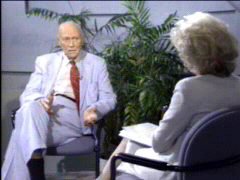- Roger O. Egeberg
Infobox Person
name = Roger Olaf Egeberg
image_size =
caption = Dr. Egeberg in an interview
birth_name =
birth_date = birth date|1902|11|13
birth_place =Chicago ,Illinois
death_date = death date and age|1997|09|13|1902|11|13
death_place =Washington, D.C.
death_cause =Pneumonia
nationality =
other_names =
known_for =
education =
alma_mater =
employer =
occupation =
home_town =
title =Assistant Secretary for Health
salary =
networth =
height =
weight =
term = 1969–1971
predecessor = Philip R. Lee
successor = Charles C. Edwards
party = Democrat
boards =
religion =
spouse = Margaret McEchron Chahoon
partner =
children = One son, three daughters
parents =
relations =
website =
footnotes =Roger Olaf Egeberg, M.D. (
13 November 1903 –12 September or13 September 1997 ) in addition to serving asGeneral Douglas MacArthur 's personal physician during WWII in the Pacific Theater, served as Assistant Secretary of Health in the Department of Health, Education and Welfare (now theUnited States Department of Health and Human Services ) during theRichard Nixon administration. Prior to his service in the Nixon administration, he was the dean of theUniversity of Southern California 's medical school. Egeberg died onSeptember 13 ,1997 .Egeberg's stance that penalties for marijuana offenses were excessive led to reduction of simple possession from a felony to a misdemeanor. In 1970, the committee reviewing the
Controlled Substances Act requested his advice on how marijuana should be regulated. In retrospect, one of the most far-reaching letters he ever wrote was this letter toHarley O. Staggers , Chairman of the House Committee on Interstate and Foreign Commerce, which led to marijuana being "temporarily" placed in Schedule I, the most tightly-controlled category of drugs::"Dear Mr. Chairman: In a prior communication, comments requested by your committee on the scientific aspects of the drug classification scheme incorporated in H.R. 18583 were provided. This communication is concerned with the proposed classification of marihuana.
:"It is presently classed in schedule I(C) along with its active constituents, the tetrahydrocannibinols and other psychotropic drugs.
:"Some question has been raised whether the use of the plant itself produces "severe psychological or physical dependence" as required by a schedule I or even schedule II criterion. Since there is still a considerable void in our knowledge of the plant and effects of the active drug contained in it, our recommendation is that marihuana be retained within schedule I at least until the completion of certain studies now underway to resolve the issue. If those studies make it appropriate for the Attorney General to change the placement of marihuana to a different schedule, he may do so in accordance with the authority provided under section 201 of the bill. . .
:"Sincerely yours, (signed) Roger O. Egeberg, M.D."
Egeberg only intended that marijuana remain in Schedule I until the
National Commission on Marihuana and Drug Abuse completed its report. However, Nixon refused to implement the Commission's recommendation that marijuana be legalized, and the drug remains in Schedule I today. Egeberg's letter has been cited in several petitions forremoval of cannabis from Schedule I of the Controlled Substances Act .Before Dr. Egeberg was named to the health post by President Richard Nixon, he had won widespread respect as a medical administrator in Los Angeles, where he was dean of the Medical School at the University of Southern California.
He was the ranking health official from 1969 to 1971, as the assistant secretary for health and scientific affairs in the Department of Health, Education and Welfare.
Dr. Egeberg (pronounced EGG-uh-berg) won admiration within the department as an outspoken advocate of expanding the Government's role in solving the nation's health care problems. He fought for more money for medical programs and for more attention to health care by the White House.
But in an interview in the spring of 1970, when he was seeking an additional $100 million to immediately expand the training of more doctors and nurses, he said that the Health, Education and Welfare Secretary, Robert H. Finch, and the department's Under Secretary, John C. Veneman, were not taking his advice on health matters and that Mr. Nixon's advisers openly ignored him.
Health care was a subject Mr. Nixon had emphasized in his 1968 campaign, but Dr. Egeberg said in the interview that "the White House just doesn't appreciate, doesn't know, what is going on in the health field." He added, "I just can't get through to Ehrlichman," referring to John D. Ehrlichman, the President's chief aide for domestic matters.
Dr. Egeberg also denied rumors at the time that he might step down, saying, "I may be fired because of my words and actions, but I won't quit."
Officials of the department, including Mr. Finch, expressed dissatisfaction with Dr. Egeberg's managerial skills. In 1971, he left his post and became the Health Secretary's special assistant for health policy, from 1971 to 1977; special assistant for health education, in 1976 and 1977, and special consultant to the President for health affairs, from 1971 to 1977.
He later worked as a professor at Georgetown University.
Dr. Egeberg was born in Chicago to Hans Olaf Egeberg and the former Ulrikka Rostrup Nielsen. He received a bachelor's degree in 1925 from Cornell and his medical degree in 1929 from Northwestern University and became an internist. In World War II he was the personal physician for Gen. Douglas MacArthur, rose to the rank of colonel and won the Bronze Star and the Legion of Merit.
Dr. Egeberg's writings include the book "The General: MacArthur and the Man He Called 'Doc.' " (1993, Oak Mountain).
References
* [http://www.ndsn.org/sepoct97/deaths.html Two National Officials Who Advocated Drug Policy Reform Pass Away] , National Drug Strategy Network.
*Gettman, Jon: [http://www.millionmarijuanamarch.com/mmm1_047.htm Science and the End of Marijuana Prohibition] .
*http://query.nytimes.com/gst/fullpage.html?res=9B03E0DA1638F936A2575AC0A961958260
Wikimedia Foundation. 2010.
